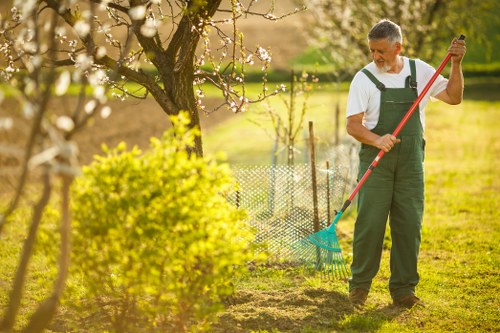Comprehensive Guide to Garden Maintenance in Kenton

Kenton boasts a unique climate and soil conditions that make garden maintenance both a rewarding and challenging task. Whether you're a seasoned gardener or a novice, understanding the specific needs of your garden in Kenton is essential for creating a thriving outdoor space.
Regular maintenance not only enhances the beauty of your garden but also ensures the health and longevity of your plants. From seasonal tasks to routine care, this guide covers everything you need to know about effective garden maintenance in Kenton.
In this article, we'll explore key aspects of garden maintenance, including soil preparation, plant selection, watering techniques, pest control, and seasonal adjustments. By following these guidelines, you can achieve a vibrant and sustainable garden that flourishes year-round.

Understanding Kenton's Climate
Kenton experiences a temperate climate with distinct seasons, each bringing its own set of challenges and opportunities for gardeners. Understanding the local climate is crucial for selecting appropriate plants and planning maintenance activities.
The region typically enjoys mild winters and warm summers, but occasional frost and heavy rainfalls can impact garden health. By selecting plants that are well-suited to Kenton's climate, you can reduce maintenance efforts and increase the resilience of your garden.
Additionally, paying attention to microclimates within your garden—such as areas with more shade or wind exposure—can help you optimize plant placement and care strategies.

Soil Preparation and Maintenance
Healthy soil is the foundation of a successful garden. In Kenton, the soil composition may vary, so it's important to assess and amend it accordingly to support your plants' needs.
Testing Your Soil
Begin by conducting a soil test to determine its pH level, nutrient content, and texture. This information will guide you in making necessary adjustments to create an optimal growing environment.
Amending the Soil
Based on the soil test results, you may need to add organic matter, such as compost or well-rotted manure, to improve soil structure and fertility. Additionally, adjusting the pH level with lime or sulfur can create a more favorable environment for your plants.
- Add compost to enhance soil fertility.
- Use mulch to retain moisture and suppress weeds.
- Incorporate organic fertilizers for sustained nutrient release.

Plant Selection and Care
Choosing the right plants is crucial for creating a sustainable and low-maintenance garden in Kenton. Consider native plants and those adapted to the local climate to reduce the need for extensive care.
Annuals vs. Perennials
Decide between annuals, which need to be replanted each year, and perennials, which come back season after season. Perennials often require less maintenance and provide continuous beauty throughout the year.
Companion Planting
Utilize companion planting techniques to enhance plant health and reduce pests naturally. For example, planting marigolds near vegetables can deter certain insects, promoting a healthier garden ecosystem.
- Choose native and climate-appropriate plants.
- Implement companion planting strategies.
- Rotate crops to prevent soil depletion and reduce pest buildup.

Watering Techniques
Proper watering is essential for garden maintenance. In Kenton, where weather patterns can be unpredictable, establishing an efficient watering routine can save water and keep plants healthy.
Drip Irrigation Systems
Consider installing drip irrigation systems to deliver water directly to the plant roots, minimizing evaporation and runoff. This method is particularly effective during hot summer months.
Watering Schedule
Adjust your watering schedule based on the season and rainfall. Early morning watering reduces the risk of disease and ensures plants receive adequate moisture throughout the day.
- Use mulch to retain soil moisture.
- Water deeply but infrequently to encourage strong root growth.
- Monitor soil moisture levels regularly.
Effective watering is the backbone of a healthy garden.
In addition to traditional watering methods, collecting rainwater in barrels can be an eco-friendly way to supplement your garden's water needs. This practice not only conserves water but also reduces your utility bills.
Avoid overwatering, which can lead to root rot and other plant diseases. Instead, focus on providing consistent and adequate moisture tailored to each plant's requirements.

Pest Control Strategies
Pests can pose significant threats to garden health. Implementing integrated pest management (IPM) techniques can help control pests effectively while minimizing environmental impact.
Identifying Common Pests in Kenton
Familiarize yourself with the most common garden pests in Kenton, such as aphids, slugs, and caterpillars. Early identification allows for prompt and targeted interventions.
Natural Pest Control Methods
Utilize natural predators like ladybugs and birds to keep pest populations in check. Additionally, organic pesticides can be used as a last resort to eliminate stubborn infestations.
- Introduce beneficial insects to your garden.
- Use neem oil or other organic treatments.
- Employ physical barriers, such as nets or row covers.

Pruning and Trimming
Regular pruning and trimming are essential for maintaining the shape and health of your plants. Proper pruning techniques can promote better air circulation and sunlight penetration, reducing the risk of disease.
When to Prune
The timing of pruning depends on the type of plant. Generally, it's best to prune in early spring or late winter before new growth begins. However, some plants may benefit from summer pruning to encourage bushier growth.
Tools and Techniques
Use sharp, clean tools to make precise cuts, minimizing damage to the plants. Disinfect tools between uses to prevent the spread of diseases.
- Remove dead or diseased branches.
- Shape plants to encourage balanced growth.
- Thin out dense areas to improve airflow.

Seasonal Garden Maintenance
Each season brings unique maintenance tasks that help your garden thrive. Preparing your garden for seasonal changes ensures its resilience and longevity.
Spring Maintenance
Spring is a time for renewal. Start by clearing out debris, fertilizing the soil, and planting new seeds or bulbs. It's also the perfect time to assess plant health and address any winter damage.
Summer Care
During the summer months, focus on watering, weeding, and monitoring for pests. Providing adequate shade and mulch can help retain moisture and keep plants cool.
- Plant heat-tolerant species.
- Regularly check for signs of stress or disease.
- Maintain consistent watering practices.

Fall and Winter Maintenance
As the growing season winds down, fall and winter maintenance prepare your garden for the colder months. This includes cleaning up fallen leaves, protecting perennials, and planning for next year's garden.
Leaf Management
Rake and compost fallen leaves to prevent mold and provide natural fertilizer for your soil. Alternatively, use leaves as mulch to insulate plant roots during winter.
Protecting Plants
Apply protective covers or burlap to sensitive plants to shield them from frost and heavy snow. Prune back overgrown shrubs and remove any damaged branches to promote healthy growth in spring.
- Compost organic matter.
- Protect delicate plants with appropriate coverings.
- Plan and sow seeds for the upcoming season.
Preparing for each season ensures your garden remains vibrant and healthy throughout the year.
By staying proactive with seasonal tasks, you can prevent common issues and enjoy a flourishing garden in Kenton regardless of the weather conditions.
Integrating these maintenance practices into your routine will help you cultivate a garden that not only looks beautiful but also supports local biodiversity and sustainability.

Tools and Equipment for Garden Maintenance
Having the right tools and equipment is essential for efficient garden maintenance. Investing in quality tools can make tasks easier and more enjoyable, allowing you to maintain your garden effectively.
Essential Tools
Basic gardening tools include a sturdy shovel, pruners, a watering can or hose, gardening gloves, and a wheelbarrow. These tools cover the fundamental tasks needed for most garden maintenance activities.
Advanced Equipment
For larger gardens or more intensive maintenance, consider additional equipment such as a lawnmower, leaf blower, irrigation systems, and composters. These tools can enhance your efficiency and expand the scope of your gardening capabilities.
- Shovel and spade for soil preparation.
- Pruners and shears for trimming.
- Watering systems for efficient irrigation.
Equipping yourself with the right tools is a key step towards successful garden maintenance.
Regularly maintaining and cleaning your tools extends their lifespan and ensures they perform optimally. Sharp, well-maintained tools make gardening tasks easier and reduce the risk of plant damage.
Organize your tools in a dedicated storage area to keep your workspace tidy and accessible.
Creating a Garden Maintenance Schedule
Establishing a garden maintenance schedule helps you stay organized and ensures that all necessary tasks are completed in a timely manner. A well-planned schedule can prevent neglect and promote consistent garden health.
Monthly Tasks
Break down maintenance activities into monthly tasks to make them more manageable. For example, in January, focus on pruning and planning, while in July, prioritize watering and pest control.
Seasonal Checklists
Create seasonal checklists to outline specific tasks for each time of year. This approach ensures that no important maintenance step is overlooked and helps you adapt to changing garden needs.
- January: Pruning and planning.
- April: Soil preparation and planting.
- September: Leaf management and protection.

Benefits of Regular Garden Maintenance
Consistent garden maintenance offers numerous benefits, from enhanced aesthetic appeal to improved plant health and increased property value.
Enhanced Curb Appeal
A well-maintained garden creates a positive first impression, enhancing the overall curb appeal of your property. This is especially beneficial if you plan to sell your home, as prospective buyers are often attracted to lush, well-kept gardens.
Environmental Benefits
Proper garden maintenance supports local ecosystems by promoting biodiversity, reducing soil erosion, and improving air quality. Healthy gardens also provide habitats for beneficial insects and wildlife.
- Boosts property value.
- Promotes environmental sustainability.
- Creates a relaxing and enjoyable outdoor space.
Regular maintenance ensures that your garden remains a source of pride and joy throughout the year.
Investing time and effort into garden upkeep pays off in the form of a beautiful and thriving outdoor space that you can enjoy with family and friends.
Whether you're working on a small backyard garden or a larger landscaping project, consistent maintenance is the key to long-term success.

Professional Garden Maintenance Services in Kenton
If managing garden maintenance on your own becomes overwhelming, hiring professional garden maintenance services in Kenton can be a great solution. Professionals bring expertise and equipment that can enhance the health and beauty of your garden.
Benefits of Hiring Professionals
Professional gardeners have the knowledge and experience to handle a wide range of maintenance tasks efficiently. They can identify and address issues that may be beyond the scope of amateur gardeners.
Services Offered
Garden maintenance services typically include lawn care, pruning, planting, pest control, irrigation management, and seasonal clean-ups. Some companies also offer design and landscaping services to transform your garden according to your vision.
- Time-saving and convenient.
- Access to specialized tools and techniques.
- Customized maintenance plans tailored to your garden's needs.
Professional maintenance can take the hassle out of gardening, allowing you to enjoy a beautiful garden without the stress.
By entrusting your garden to experts, you ensure that it receives the best possible care, promoting its health and aesthetic appeal.
Consider reaching out to local Kenton garden maintenance services to explore your options and find a provider that meets your specific needs.

Sustainable Garden Maintenance Practices
Embracing sustainable practices in garden maintenance not only benefits the environment but also creates a healthier and more resilient garden.
Composting
Composting organic waste reduces landfill contributions and provides a rich source of nutrients for your garden. It improves soil structure and fertility, promoting stronger plant growth.
Rainwater Harvesting
Collecting and utilizing rainwater for irrigation conserves water and reduces your reliance on municipal water sources. It also ensures that plants receive naturally soft water, which is beneficial for their health.
- Use organic fertilizers to nourish plants naturally.
- Implement mulching to conserve moisture and reduce weeds.
- Encourage biodiversity by planting a variety of species.
Sustainable maintenance practices contribute to a healthier environment and a more self-sufficient garden.
By making eco-friendly choices, you support local ecosystems and reduce the carbon footprint of your gardening activities.
Incorporate these practices into your routine to create a garden that thrives in harmony with nature.

Common Garden Maintenance Mistakes to Avoid
Avoiding common mistakes in garden maintenance can save you time, effort, and resources. Being aware of these pitfalls helps you maintain a healthy and vibrant garden.
Overwatering
Overwatering is a frequent mistake that can lead to root rot and other plant diseases. It's essential to understand the watering needs of each plant and adjust accordingly.
Poor Planning
Lack of planning can result in a disorganized garden with overcrowded plants, poor soil conditions, and inefficient use of space. Effective planning ensures a balanced and aesthetically pleasing garden layout.
- Don’t neglect soil health—regularly amend and test your soil.
- Avoid planting incompatible species together.
- Don’t ignore signs of pests or disease—address issues early.
Avoiding these mistakes can significantly improve the health and appearance of your garden.
Learning from common errors allows you to develop better maintenance habits and achieve more consistent results.
Stay informed and proactive to ensure your garden remains a source of pride and enjoyment.

Innovative Garden Maintenance Tips
Incorporating innovative techniques and technologies can enhance your garden maintenance routine, making it more efficient and effective.
Smart Irrigation Systems
Utilize smart irrigation systems that adjust watering schedules based on weather conditions and soil moisture levels. These systems optimize water usage and ensure plants receive the right amount of moisture.
Vertical Gardening
Vertical gardening maximizes limited space and adds visual interest to your garden. It's an excellent option for small gardens or areas with limited sunlight.
- Implement drip irrigation for precise watering.
- Use raised beds to improve soil management.
- Incorporate technology for monitoring plant health.
Innovative practices can revolutionize your approach to garden maintenance, making it more sustainable and enjoyable.
By embracing new ideas and technologies, you can enhance the efficiency and effectiveness of your maintenance efforts.
Stay curious and open to experimenting with different techniques to continually improve your garden care routine.
Conclusion
Maintaining a garden in Kenton requires a blend of knowledge, effort, and strategic planning. By understanding the local climate, preparing your soil, selecting suitable plants, and implementing effective maintenance practices, you can cultivate a thriving garden that brings beauty and joy to your outdoor space.
Regular upkeep, coupled with sustainable practices, ensures that your garden remains healthy and resilient throughout the year. Whether you choose to manage your garden independently or enlist professional services, the key is consistency and attention to detail.
Ready to transform your garden? Contact us today to book your garden maintenance service and enjoy a lush, vibrant garden in Kenton.